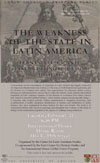How do I see the video/hear the audio? There are two ways to experience the multimedia content on this site:
- Download: Just right-click (or control-click on a Mac) on a link that says "download" and choose "save file as" (or something similar) -- this will save a .mov (Quicktime) or .mp3 file onto your computer. Since these files might be very large, this is only recommended if you have a fast connection and a lot of room on your hard drive.
- In your browser: If you don't want to save the file on your computer, click the "new window" link. The audio or video file should begin playing in a new window. To see video or hear audio in your browser, you'll need the free Quicktime plugin for your browser. We also recommend using a standards-compliant browser such as Firefox to view this site.
What is a podcast? Podcasting is a method of distributing multimedia content over the web. When you use a program called a "podcatcher" to subscribe to a podcast, the podcatcher will periodically check to see if new content (in this case, audio or video files) has been added to the podcast. If new content is available, the podcatcher will automatically download the new file(s) for you, making them available to play on your computer, iPod, or other digital media device.
What do these buttons mean?
![]() will take you to a page that will allow you to subscribe via one of several different podcatchers. You can also right-click (control-click for Mac) and copy the address into the podcatcher of your choice.
will take you to a page that will allow you to subscribe via one of several different podcatchers. You can also right-click (control-click for Mac) and copy the address into the podcatcher of your choice.
![]() will allow you to subscribe to the podcast via the iTunes music store, if that is your preferred podcatcher. It's free to subscribe and download podcasts from iTunes, but you have to have iTunes installed on your computer (download it now).
will allow you to subscribe to the podcast via the iTunes music store, if that is your preferred podcatcher. It's free to subscribe and download podcasts from iTunes, but you have to have iTunes installed on your computer (download it now).
Still confused? The University has posted information about RSS, the technology behind podcasting as well as information about subscribing to RSS feeds. If you want to learn more, you can also read Wikipedia's article on podcasting.
More questions? Please e-mail chiasmos@uchicago.edu.

"The Weakness of the State in Latin America"
February 22, 2005
Fernando Escalante, Tinker Visting Professor in History, University of Chicago and Professor, El Colegio de Mexico
From the Center for Latin American Studies' Latin American Briefing Series.
more information:
summary
Conversations on the consolidation of democracy in Latin America have largely overlooked two important characteristics: the weakness of the state, in both financial and legal terms, and the absence of a common civic culture. New opportunities for education, health services, and access to information have served only to widen the extreme social, cultural, and political inequalities in Latin American countries. In this absence of a common civic culture, citizens have turned to powerful political brokers - union leaders, caciques, businesspeople, clergy - to negotiate daily political activities. Policies implemented to strengthen democracy, such as privatization of public enterprises, liberalization of markets, and stabilization of public finances, have been manipulated by these brokers for their own benefit. The result is an unexpected political order based on patronage and clientelism that is always on the brink of sliding toward authoritarian populism at the expense of building strong institutions.
Fernando Escalante is a public intellectual of wide renown in Mexico and Spain. A historical sociologist and professor at El Colegio de Mexico, he is the author of six books and countless scholarly articles. His study of civic culture, Imaginary Citizens (1992), explores the everyday moral habits and interests of various social groups following independence to show that it was virtually impossible for anyone to conduct politics as an ideal citizen, able to balance private interest with public good. The book has been through three editions, and has made his reputation as an erudite and original interpreter of Mexican politics. While at the University of Chicago, Prof. Escalante's course offerings include "Political Order in Latin America" (Winter 2005) and "Political Cultures of the Left" (Spring 2005).
Recent articles (in Spanish) by Prof. Escalante include:
1) "México, fin de siglo"
2) "La transición al desencanto"
3) "El nuevo indigenismo y el EZLN"
4) "Anomia y Estado"
